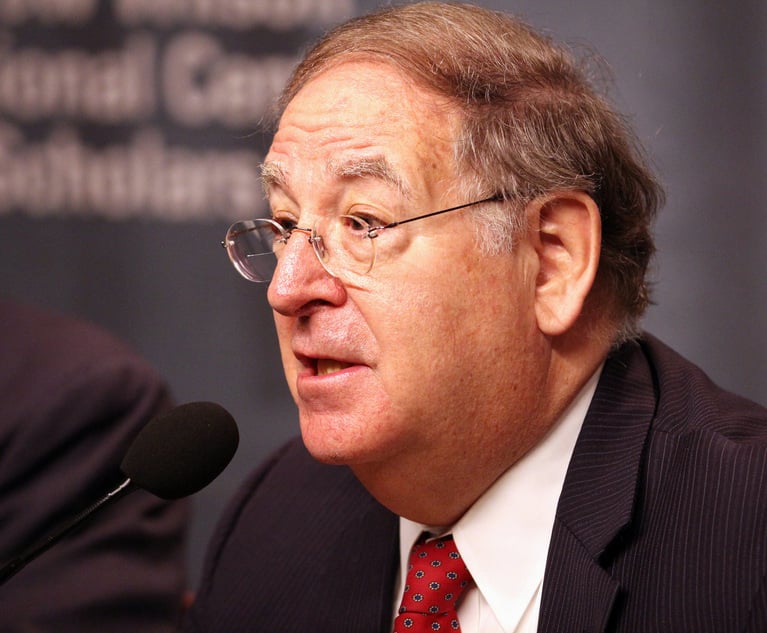Groupon Wins Appeal Over Reimbursement Policy
The Fourth Circuit cited a 2017 U.S. Supreme Court decision from last year that struck down a procedural tactic used by plaintiffs to get their appeals heard.
March 28, 2018 at 03:04 PM
4 minute read

A federal appeals court has tossed a consumer class action against Groupon Inc. citing a U.S. Supreme Court decision from last year that struck down a procedural tactic used by plaintiffs.
The U.S. Court of Appeals for the Fourth Circuit found on Tuesday that it lacked jurisdiction to hear the appeal of Erin Keena, who sued over Groupon's reimbursement policy. The unanimous panel found that Keena, who had asked the judge below to dismiss the case so he could appeal his arbitration order, had tried the same procedural tactic that Justice Ruth Bader Ginsburg rejected in Microsoft v. Baker.
“Justice Ginsburg's opinion in Microsoft rejected the nearly identical effort made in that case, characterizing Baker's appeal to the court of appeals as arising from a 'voluntary-dismissal tactic' that contravenes the final-judgment rule,” wrote Judge Robert King. “Justice Ginsburg's rationale is instructive here, and provides an apt description of what occurred in Keena's effort to secure an immediate appeal.”
Scott Schutte, a partner at Morgan, Lewis & Bockius in Chicago, who represented Groupon, declined to comment. Keena's lawyer, Daniel Flint of the Law Offices of Daniel C. Flint in Southfield, Michigan, did not respond to a request for comment.
Keena sued after Groupon provided her with a credit toward a future purchase, rather than cash, as a refund for a $29 massage she purchased in 2015. On appeal, Keena challenged the arbitration clause, while Groupon said she lacked standing under Article III of the Constitution since she had no “personal stake” in the litigation anymore. The Fourth Circuit asked for supplemental briefs following the Microsoft decision.
In that June 12 decision, the Supreme Court blocked a controversial procedural tool used by plaintiffs to appeal class certification orders by voluntarily dismissing their own case. Plaintiffs had brought a class action over Microsoft's Xbox 360 video-game consoles.
The Supreme Court found the move violated Federal Rule of Civil Procedure 23(f), which permits interlocutory appeals of class certification, and it wasn't a “final decision” under Judiciary and Judicial Procedure Code 1291. The ruling has prompted other courts to toss class actions over similar tactics. On Oct. 12, the Ninth Circuit granted dismissal of an appeal in a consumer class action over Cymbalta, an antidepressant prescription drug, citing Microsoft. Then, on Feb. 1, the Ninth Circuit dismissed a malpractice class action against the law firm Milberg.
The Second Circuit also cited Microsoft in an Oct. 5 summary order dismissing an appeal of an arbitration ruling—a decision that both sides in the Groupon case addressed in supplemental notices.
The Fourth Circuit found Microsoft's holding analogous, even though it dealt with a ruling over arbitration rather than class certification. In particular, Keena asked U.S. District Judge Graham Mullen of the Western District of North Carolina to amend his arbitration order to include dismissal of her case, insisting “she would not pursue arbitration because the cost of that process outweighed the potential recovery,” the ruling says. In the alternative, she asked that he certify his order for appeal. Mullen granted her request as to dismissal, allowing Keena to appeal.
The court concluded that Keena was required to participate in arbitration proceedings in order to reach a “final decision.”
“Put succinctly, in seeking to create final order 1291 jurisdiction, Keena has, like the plaintiff in Microsoft, pursued her own version of the voluntary-dismissal tactic that the Supreme Court soundly repudiated,” King wrote.
In a footnote, the Fourth Circuit acknowledged Keena's argument that she didn't actually voluntarily dismiss her case, concluding: “This is a distinction without a difference.”
This content has been archived. It is available through our partners, LexisNexis® and Bloomberg Law.
To view this content, please continue to their sites.
Not a Lexis Subscriber?
Subscribe Now
Not a Bloomberg Law Subscriber?
Subscribe Now
NOT FOR REPRINT
© 2025 ALM Global, LLC, All Rights Reserved. Request academic re-use from www.copyright.com. All other uses, submit a request to [email protected]. For more information visit Asset & Logo Licensing.
You Might Like
View All
'Thoughtful Jurist': Maryland US District Senior Judge Messitte Dies After Short Illness
4 minute read
'Religious Discrimination'?: 4th Circuit Revives Challenge to Employer Vaccine Mandate
2 minute read
4th Circuit Revives Racial Harassment Lawsuit Against North Carolina School District
3 minute read
DOJ, 10 State AGs File Amended Antitrust Complaint Against RealPage and Big Landlords
4 minute readTrending Stories
- 1Courts Grapple With The Corporate Transparency Act
- 2FTC Chair Lina Khan Sues John Deere Over 'Right to Repair,' Infuriates Successor
- 3‘Facebook’s Descent Into Toxic Masculinity’ Prompts Stanford Professor to Drop Meta as Client
- 4Pa. Superior Court: Sorority's Interview Notes Not Shielded From Discovery in Lawsuit Over Student's Death
- 5Kraken’s Chief Legal Officer Exits, Eyes Role in Trump Administration
Who Got The Work
J. Brugh Lower of Gibbons has entered an appearance for industrial equipment supplier Devco Corporation in a pending trademark infringement lawsuit. The suit, accusing the defendant of selling knock-off Graco products, was filed Dec. 18 in New Jersey District Court by Rivkin Radler on behalf of Graco Inc. and Graco Minnesota. The case, assigned to U.S. District Judge Zahid N. Quraishi, is 3:24-cv-11294, Graco Inc. et al v. Devco Corporation.
Who Got The Work
Rebecca Maller-Stein and Kent A. Yalowitz of Arnold & Porter Kaye Scholer have entered their appearances for Hanaco Venture Capital and its executives, Lior Prosor and David Frankel, in a pending securities lawsuit. The action, filed on Dec. 24 in New York Southern District Court by Zell, Aron & Co. on behalf of Goldeneye Advisors, accuses the defendants of negligently and fraudulently managing the plaintiff's $1 million investment. The case, assigned to U.S. District Judge Vernon S. Broderick, is 1:24-cv-09918, Goldeneye Advisors, LLC v. Hanaco Venture Capital, Ltd. et al.
Who Got The Work
Attorneys from A&O Shearman has stepped in as defense counsel for Toronto-Dominion Bank and other defendants in a pending securities class action. The suit, filed Dec. 11 in New York Southern District Court by Bleichmar Fonti & Auld, accuses the defendants of concealing the bank's 'pervasive' deficiencies in regards to its compliance with the Bank Secrecy Act and the quality of its anti-money laundering controls. The case, assigned to U.S. District Judge Arun Subramanian, is 1:24-cv-09445, Gonzalez v. The Toronto-Dominion Bank et al.
Who Got The Work
Crown Castle International, a Pennsylvania company providing shared communications infrastructure, has turned to Luke D. Wolf of Gordon Rees Scully Mansukhani to fend off a pending breach-of-contract lawsuit. The court action, filed Nov. 25 in Michigan Eastern District Court by Hooper Hathaway PC on behalf of The Town Residences LLC, accuses Crown Castle of failing to transfer approximately $30,000 in utility payments from T-Mobile in breach of a roof-top lease and assignment agreement. The case, assigned to U.S. District Judge Susan K. Declercq, is 2:24-cv-13131, The Town Residences LLC v. T-Mobile US, Inc. et al.
Who Got The Work
Wilfred P. Coronato and Daniel M. Schwartz of McCarter & English have stepped in as defense counsel to Electrolux Home Products Inc. in a pending product liability lawsuit. The court action, filed Nov. 26 in New York Eastern District Court by Poulos Lopiccolo PC and Nagel Rice LLP on behalf of David Stern, alleges that the defendant's refrigerators’ drawers and shelving repeatedly break and fall apart within months after purchase. The case, assigned to U.S. District Judge Joan M. Azrack, is 2:24-cv-08204, Stern v. Electrolux Home Products, Inc.
Featured Firms
Law Offices of Gary Martin Hays & Associates, P.C.
(470) 294-1674
Law Offices of Mark E. Salomone
(857) 444-6468
Smith & Hassler
(713) 739-1250










